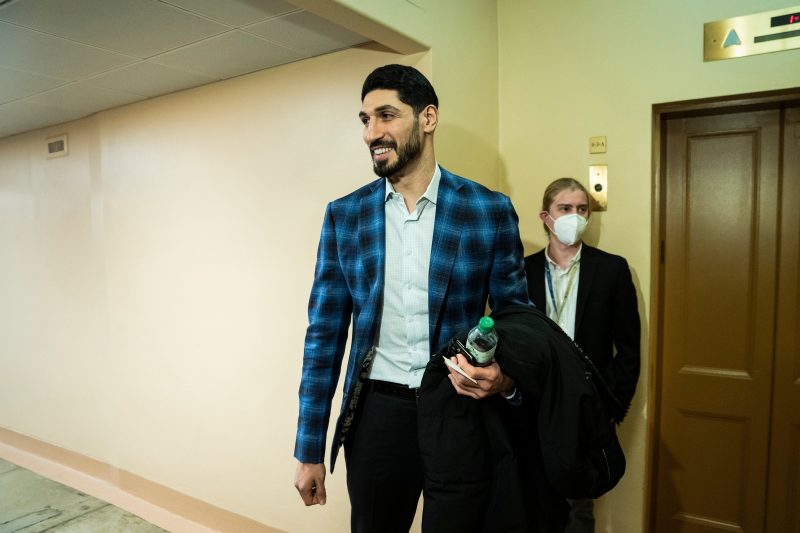Enes Kanter Freedom, the former NBA player known for his outspoken political activism against China, was banned from TikTok for 12 days before being reinstated Thursday, when lawmakers were grilling the Chinese-owned company’s chief, the company confirmed Friday.
Freedom’s account was banned on March 11 following several warnings that his past videos had broken the app’s “community guidelines,” he told The Washington Post.
Freedom appealed the ban shortly after but was told that TikTok reviewers had determined his account would not be restored. On Thursday, TikTok reinstated the account while CEO Shou Zi Chew was on Capitol Hill to argue that Americans’ TikTok feeds are unaffected by China’s censorship rules.
A TikTok representative called the ban an error by the company’s U.S.-based moderators and said TikTok does not remove content at the request of the Chinese government. They declined to say how the error occurred or what rules Freedom’s videos had allegedly violated.
Since being reinstated, Freedom has used his TikTok account, where he has 362,000 followers and more than 6 million likes, to post about the episode. He said he intended to continue posting on TikTok, which he said China uses to “brainwash our people,” because he wanted to use “their own weapon against them.”
Freedom shared screenshots and a screen recording to substantiate his claims. TikTok did not dispute the ban but said such mistakes are the natural consequence of an app with more than 150 million U.S. accounts.
Rep. August Pfluger (R-Tex.), who spoke with Freedom before the congressional hearing, asked Chew about the ban during a heated line of questioning in which Pfluger also asked whether Chew supported genocide. (Chew said he did not.)
Pfluger told The Post that he suspected that TikTok was “hiding information” and that the reinstatement had been ordered by the Chinese Communist Party, which the company disputed. The lawmaker said the episode underscored the national security risks of allowing a company based in China to own one of America’s most popular apps.
If Chinese authorities are “the arbiter of what can and can’t be shown,” he said, “they have the capability to shape messages. So what are those messages, and how do they relate to the undermining of the U.S.A.?”
Freedom, a Turkish American player who changed his last name after becoming a U.S. citizen in 2021, has become a popular figure on the right because of his vocal criticism of China and the businesses that he argues have not stood up to its authoritarian government, including Nike and the NBA.
While playing in the NBA for more than a decade, he drew attention for wearing shoes with such slogans as “Free Tibet,” “No Beijing” and “Stop Genocide,” a reference to China’s mass detention of Uyghur Muslims in the Xinjiang region. In 2021, he was traded from the Boston Celtics and then released from playing, which he has argued was in retaliation for his China criticism.
Freedom has often used his social media accounts to criticize the Chinese state. After a Facebook post in 2021 calling President Xi Jinping a “brutal dictator” for his government’s oppression of Tibet, China blocked all Celtics games from its internet.
Freedom has used his TikTok account in much the same way. One TikTok video from April, showing strict coronavirus-control measures in Shanghai, remains online on the platform and has more than 200,000 views.
TikTok, like other social networks, uses an account-enforcement system to track rule violations and penalize repeat offenders. Instead of a “three-strike” policy, TikTok’s system applies different weights to violations based on their severity and bans accounts that surpass a certain threshold.
The TikTok representative said some of Freedom’s past violations were correctly determined but would not specify them and said the moderation error had improperly knocked his account over the line.
Freedom told The Post that he had received warnings in previous months and did not know which video triggered the ban. His most recent visible TikTok video before the ban, on March 9, did not break any obvious rules and showed only female protesters in Afghanistan.
He shared with The Post a screenshot of his TikTok account showing how a video he’d posted last year — of pets from covid-positive people that were tied up and awaiting slaughter in China — had been removed for an unspecified violation of community guidelines. TikTok restored the video after questions from The Post.
Since being reinstated, Freedom has posted TikTok videos criticizing the company and calling Chew a “liar” and the Communist Party’s “puppet.” The videos have been viewed thousands of times.
Freedom said that he is in Washington for meetings with members of Congress who are critical of China’s influence and that he attended a dinner Wednesday with lawmakers and Silicon Valley figures to discuss TikTok’s alleged national security risks.
Freedom said he had meetings scheduled Friday with members of the House committee on China. Pfluger said that Freedom was invited into a markup session of the House Committee on Energy and Commerce, which hosted the Chew hearing, and that he received a standing ovation.
TikTok’s moderation system has been accused of a “haphazard” approach to account suspensions even beyond political or China-related issues.
Freedom’s ban parallels other TikTok enforcement actions, including the suspension in 2019 of Feroza Aziz, a 17-year-old user who had criticized China’s detention camps.
TikTok also restored that account, blaming a moderation error. Aziz’s 164,000-follower account features videos about the Uyghur camps that have been viewed millions of times.
The TikTok platform in the United States features many videos discussing issues the Chinese government censors inside its borders, including #Uyghur treatment (278 million views), the pro-democracy protests of #TiananmenSquare (18 million views) and #FreeTibet (13 million views).

